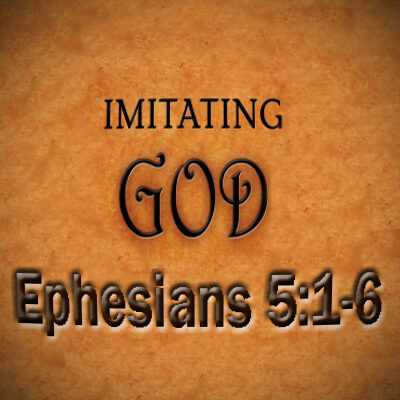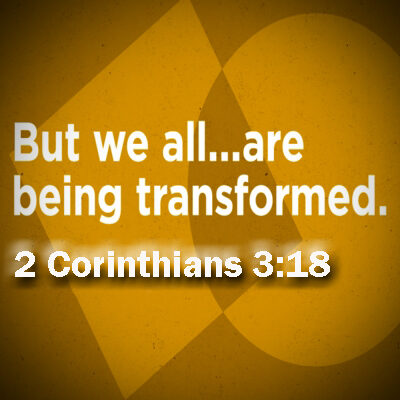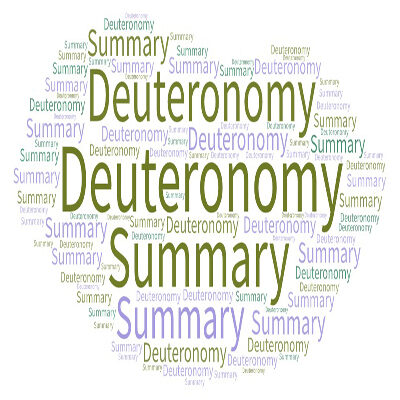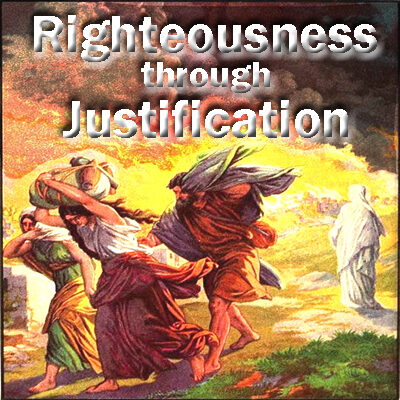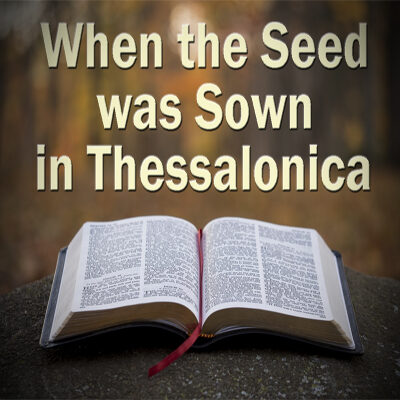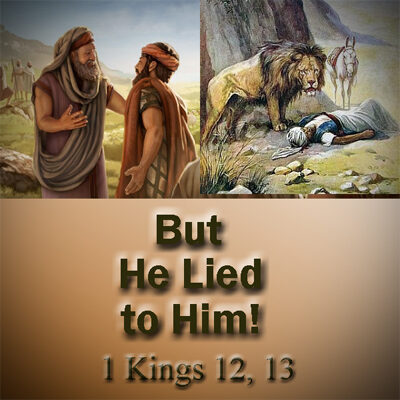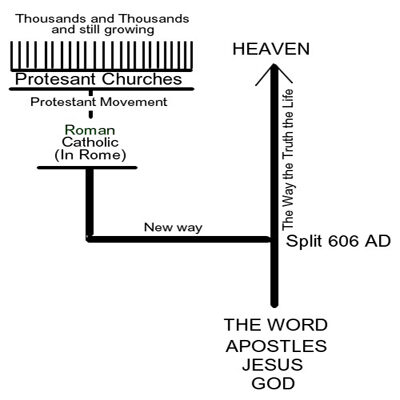“Therefore be imitators of God as dear children” (Ephesians 5:1). Jesus is the reflection of the Father. Remember the saying [The apple doesn’t fall far from the tree]? In context here Paul is saying the same thing. As children of your Heavenly Father—you need to imitate him. We need to imitate Jesus as well—knowing that He is the reflection of His Father. Remember what Jesus said to Philip, “He who has seen Me has seen the Father; so how can you say, ‘Show us the Father’?” (John 14:9). Paul writing to the saints at Colossi said, “The Son is the image of the invisible God” (Col. 1:15), and let’s not forget John 1:1, “In the beginning was the word, the word was with God, and the word was God”
Why imitate God and Christ? The question should not be why—but why not. When we consider the love of God—the provision of God—the extraordinary power of God to save that which is lost.
Why would any member of His family not strive to imitate Him as much as possible?
The Apostle Paul wrote, “9 And let us not grow weary while doing good, for in due season we shall reap if we do not lose heart. 10 Therefore, as we have opportunity, let us do good to all, especially to those who are of the household of faith.” (Gal. 6:9-10). Have you ever thought about what it means to “grow weary while doing good”? Why does it matter if we give up when we are weary? Is Paul saying that we must never grow weary—that we should never tire while doing good? Of course not. But there will be times as we labor in the kingdom that we’ll be pounded by the storms of life. There will be times when we may feel like giving up and giving in. Times when we question ourselves asking, will it really matter if I give up, or keep trying?” Possibly, the storm comes in the form of some specific temptation: Lying, cursing, profanity, stealing, gambling, dancing, immodest dress, pornography, fornication, adultery, drugs, or drinking. We all face the storms, none are exempt…
In Ephesians 4:17 Paul wrote, “This I say, therefore, and testify in the Lord, that you should no longer walk as [a]the rest of the Gentiles walk, in the futility of their mind” . We know who we are as God’s people, now Paul says, to all God’s children you must put off “your former conduct, the old man” (v.22) and (v.24) “put on the new man created according to God, in true righteousness and holiness”. In this lesson we learn from the Apostle just what it means to put off the old and put on the new. In verses 25 through 32 Paul makes five points for us in theses 8 verses that teach us what we must stop doing and what we must start doing. Putting these into practice will in effect—put off the old—and put on the new causing each of us to think anew. Transformation is what this is all about, renewing our minds by overwriting the worldliness, the old behaviors, the old way of thinking replacing that with “true righteousness and holiness” created according to God (v.24). To accomplish this we need to learn to stop practicing certain worldly behaviors and start participating in righteous and holy behaviors.
Paul wrote, “But we all, with unveiled face, beholding as in a mirror the glory of the Lord, are being transformed into the same image from glory to glory, just as [a]by the Spirit of the Lord.” (2 Cor. 3:18). This passage gives us the very purpose for which we were created, why we were brought into this world, why God created us and explains His very purpose for us. To be made like His Son. Elihu Contradicts Job said, “The Spirit of God has made me, and the breath of the Almighty gives me life” (Job 33:4).
Friends, every that exist comes from this God, the sun, the moon, the galaxies, all life comes from this God. He is the origin of everything that exist. “in Him we live and move and have our being” (Acts 17:28), He is the God of all flesh, the God of all creation, and He is deserving of our love. Because He created us for that purpose.
Throughout this lesson we must understand that “The truth is in Jesus” and if the truth is in Jesus, then it cannot be in the world. If the truth is in Jesus, then it is not in your mind. Keep in mind these two verses from Isaiah “8 “For My thoughts are not your thoughts, nor are your ways My ways,” says the Lord. 9 “For as the heavens are higher than the earth, so are My ways higher than your ways, and My thoughts than your thoughts.” (Isaiah 55:8-9). Unless we conform our minds, our ways to the Spirit by the word of God—our thinking is false—futile, darkened and ignorant because of blindness. Paul begins chapter four of Ephesians by saying, “This I say, therefore, and testify in the Lord, that you should no longer walk as [a]the rest of the Gentiles walk, in the futility of their mind” (Eph. 4:17).
This study will be like putting together a puzzle with many pieces. Each piece is like an individual scripture in the book, that you are so focused on getting it right, in the right place. You don’t see the big picture until the puzzle in complete and you step back. We will look at the book of Deuteronomy not as individual verses, but as scenes and concepts as a whole, seeing what the whole message of the book is about.
In describing Lot the Apostle Peter said how God, “7 and delivered righteous Lot, who was oppressed by the filthy conduct of the wicked 8 (for that righteous man, dwelling among them, tormented his righteous soul from day to day by seeing and hearing their lawless deeds)— 9 then the Lord knows how to deliver the godly out of temptations and to reserve the unjust under punishment for the day of judgment,” (2 Peter 2:7-9).
In this lesson we will consider how Lot, being a man who did make mistakes, could be considered “righteous”. We’ll look at the biblical definition or what a righteous person is and other examples we can learn from and make application in our own lives. Consider Solomon wrote, “The name of the Lord is a strong tower; The righteous run to it and are [e]safe” (Proverbs 18:10). Let’s study the scripture together and see what God wants from us in the way of righteousness.
owing the Word of God anywhere has potential to draw the lost to Christ. Certainly the word of God is the power of God unto salvation, and Christians are called to sow, and water and to wait and watch God bring forth the increase. There are many examples in the scriptures of sowers and of the results. Thessalonica is one great example.
In this lesson we learn how king Rehoboam took counsel from two, opposing parties, the counselors his father Solomon had, and from his own friends. Reading 1 Kings 12 we soon learn two major things. One, who told the truth and who lied, and second the two attitudes concerning governing people. Then we read on into chapter 13 and learn of another liar that caused the death of a man of God. We must decide are we going to listen to man, or God? Are we focused on physical, or spiritual things.
WHOSE NAME IS PROMINANT WHERE YOU WORSHIP? “For there is one God and one Mediator between God and men, the Man Christ Jesus” (1 Timothy 2:5).
